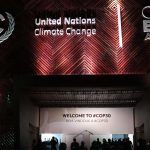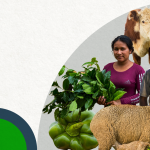FAO and Latin American and Caribbean countries promote climate and agricultural agendas for COP30
- News
-
Oct 21
- Compartir publicación
Tth Platform of Latin America and the Caribbean for Climate Action on Agriculture en Agricultura (PLACA), with the of Food and Agriculture Organization of the United Nations, led a series of virtual events as part of the preparatory actions for the work agendas of the upcoming of the United Nations Climate Change Conference, COP30.
October 21, 2025. From August 19 to October 15, the Platform of Latin America and the Caribbean for Climate Action on Agriculture (PLACA) held a series of virtual dialogues entitled: "Road to COP30: Review of a roadmap for climate action in agriculture", which sought to strengthen the technical and institutional capacities of the PLACA member countriesthat will participate in the negotiation processes at the next United Nations Climate Change Conference (COP30).
From the Food and Agriculture Organization of the United Nations (FAO) as technical secretariat of PLACA, Luiz Beduschi, Senior Rural Development Policy Officer and Coordinator of the Regional Priority of Better Environment in Latin America and the Caribbean, stressed the importance of these spaces to strengthen regional action.
"Agriculture in Latin America and the Caribbean is one of the most powerful solutions to climate change. With these dialogues in the run-up to COP30, we are strengthening the capacities of the countries so that the voice of the region's agrifood sector can play a central role in international negotiations," he said.
Sharm El-Sheikh
Following the 62nd Session of the Subsidiary Bodies of the United Nations Framework Convention on Climate Change, held in Bonn in June this year - a key interim event held every year in preparation for the next climate summit - PLACA organized a first virtual event to present an updated overview towards COP30.
This webinar provided, on the one hand, a general context on COP30 and how Brazil is preparing; and, on the other hand, analyzed the results of the 62nd session, identifying common priorities and aligning technical and political positions, particularly in relation to the implementation of the decision adopted in Sharm el-Sheikh (COP27), which addresses the need for specific climate action in the agricultural sector and food security, recognizing the importance of the sector in the response to global climate change.
Panelists from Chile, Ecuador and Paraguay agreed that the region is already at the stage of implementing concrete actions, stressing that access to financing and the Sharm el-Sheikh online portal will be key to this process.
They also stressed the importance of working together and training to influence the negotiation process. They also stressed that agriculture should continue to be a priority in the negotiations.
Nationally Determined Contributions
In the second event, the dialogue focused on the role of agriculture in the new 2025 Nationally Determined Contributions (NDCs). Regional experiences, tools and innovations were shared to align adaptation, mitigation and national planning processes; and methodologies and tools to strengthen the sector's Measurement, Reporting and Verification systems were explored.
Costa Rica, Ecuador and Peru made presentations, stressing the need to incorporate NDCs into the work of the agricultural sector and emphasizing that the inclusion of agriculture requires the coordination of decrees, policies and other institutional mechanisms to create the necessary conditions.
Also, emphasis was placed on strengthening communication and coordination between the agricultural sector, the environmental sector and other actors, such as the private sector and international cooperation agencies, in order to achieve common objectives and strengthen monitoring, reporting and verification systems. In this line, public, private and academic interinstitutionality emerged as a fundamental axis to determine methodologies and lines of work and data review.
Paris Agreement
The September 9 meeting addressed the challenges and opportunities for developing countries in the interaction between Articles 5 and 6 of the Paris Agreement to integrate REDD+ and market mechanisms in the Agriculture, Forestry and Other Land Use (AFOLU) sector; regional experiences and good practices to ensure environmental integrity, equity in benefits and effective participation.
Loss and damage in agriculture
On October 15, the fourth and last session of the webinar series was held. This time the dialogue focused on the Loss and Damage Fund for the agricultural sector in the region. Leading panelists from FAO and Honduras analyzed the eligibility criteria for proposals, methodologies for measuring agricultural losses and how to ensure that global response mechanisms are aligned with the needs of rural communities.
With this series of webinars, PLACA continues to carry out actions that consolidate it as a technical instrument for regional cooperation that promotes the exchange of experiences and knowledge among countries in Latin America and the Caribbean. Under a South-South cooperation approach, the Platform strengthens the capacities of the ministries of agriculture and builds bridges of collaboration with other international institutions and organizations that connect national priorities with the global climate agenda in the run-up to COP30, to be held from 10 to 21 November in Belém do Pará, Brazil.
Noticias relacionadas
Cart
- Telegram
- Tumblr
- VKontakte
- Copy link
Suscríbete al Boletín de Noticias
Suscríbete al Boletín de Noticias Semestral de PLACA y recibe información sobre:
Sin spam · Cancela cuando quieras



